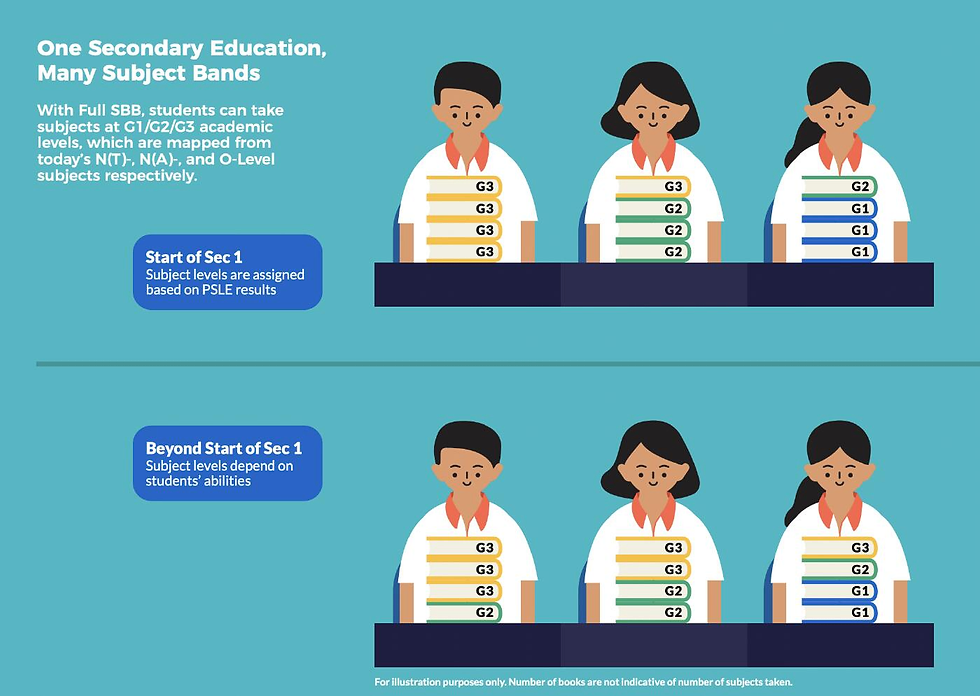I. Introduction
Welcome to the Ultimate Guide to the PSLE Achievement Levels (AL) System in Singapore
Navigating the new Achievement Levels (AL) scoring system for the Primary School Leaving Examination (PSLE) in Singapore can be overwhelming for many parents. This definitive guide is here to break down the complexities of the PSLE AL system and offer you practical insights that will help you optimize your child’s learning and academic journey.
As an advocate for fostering educational growth, I believe that understanding the PSLE AL system is key to making informed decisions about your child’s education. By familiarizing yourself with the AL system, you’ll be better equipped to support your child in their academic endeavors and future schooling choices.
The PSLE AL System Explained
The Ministry of Education (MOE) introduced the new PSLE Achievement Levels (AL) scoring system in 2021 to create a more personalized and holistic approach to academic performance. Unlike the old T-score system, which ranked students in comparison to their peers, the AL system focuses on individual achievements and strives to alleviate the unhealthy pressure and competition.
In this guide, we’ll take an in-depth look at how the AL system works, its benefits, and the best strategies to help your child excel under this new framework. You’ll also learn how the AL score impacts secondary school placements and how Math tuition can help your child achieve better results in this subject.
II. Background and Rationale for the PSLE AL System
Why the Change?
The move from the T-score system to the Achievement Levels (AL) system in the PSLE was driven by the desire to foster a healthier academic environment. Under the T-score system, students were ranked based on their relative performance, which often led to excessive competition and stress. The AL system, on the other hand, reflects a student’s individual progress, reducing pressure and promoting a more well-rounded education.
PSLE AL vs. T-Score: A Clearer Path Forward
- T-score: Ranked students based on performance relative to their peers, creating competition and comparison.
- AL system: Scores students on individual achievements, providing a more accurate reflection of their abilities.
This shift helps promote lifelong learning, focusing on progress rather than just a numerical ranking. The new system encourages students to take pride in their personal growth, not just their ranking in relation to others.
III. The Achievement Levels (AL) System Explained
Breaking Down the AL System:
The PSLE Achievement Levels (AL) system provides a score range from 1 to 8 for each subject, with AL 1 being the highest and AL 8 being the lowest. These levels reflect the student’s overall performance and proficiency in each subject. The AL scores are based on percentage bands and represent the degree of mastery a student has achieved.
AL Score Breakdown:
- AL 1: Outstanding achievement (90-100%)
- AL 2: Very good achievement (85-89%)
- AL 3: Good achievement (80-84%)
- AL 4: Above average achievement (75-79%)
- AL 5: Average achievement (65-74%)
- AL 6: Below average achievement (45-64%)
- AL 7: Marginal achievement (20-44%)
- AL 8: Needs improvement (below 20%)
The goal is to reduce academic stress by moving away from relative competition, offering a more personalized approach to student performance.
Foundation vs. Standard Levels:
- Standard Level: For students who are proficient in the subject, with AL scores ranging from 1 to 8.
- Foundation Level: For students who need additional support, with AL scores ranging from 5 to 8.
When choosing between Standard and Foundation levels, it’s crucial to consider your child’s strengths and weaknesses to ensure that they receive the right level of challenge and support.
IV. Optimizing Your Child’s Learning Journey for PSLE AL Success
How to Help Your Child Excel in the PSLE AL System
- Set Realistic Goals: Help your child set clear, achievable targets for each subject based on their strengths. The AL system rewards steady progress, so setting manageable goals will help your child stay motivated.
- Create a Tailored Study Plan: Focus on reinforcing your child’s strengths while addressing weaker areas. Regular review sessions for subjects like Math, Science, and English can go a long way in improving overall performance.
- Consider Math Tuition for Additional Support: Specialized Math tuition can make a significant difference in helping your child achieve high AL scores. A focused approach to key topics such as fractions, algebra, and problem-solving techniques can bolster your child’s academic foundation.
- Foster a Growth Mindset: Encourage your child to view mistakes as opportunities to learn. The AL system rewards improvement, so adopting a growth mindset is essential for success.
V. Navigating Secondary School Admissions with AL Scores
Understanding how the PSLE AL score impacts secondary school admissions is essential for parents and students. Secondary schools use a student’s total AL score to determine their eligibility for various academic tracks. A lower AL score increases the likelihood of securing placement in more competitive schools.
Tips for Secondary School Placement
- Aim for a Low Total AL Score: The goal is to achieve as low a total AL score as possible, which indicates better performance across subjects.
- Subject Combinations Matter: Understand how different combinations of Foundation and Standard level subjects will impact your child’s total AL score and school placement.
The more informed you are about how AL scores work, the better you can help your child plan ahead for secondary school options that align with their strengths and aspirations.
VI. Optimizing Your Child’s Learning Journey Under the New AL System
Setting Your Child Up for Success in the PSLE
With the new Achievement Levels (AL) system, your approach to supporting your child’s learning can be more personalized and strategic. Here’s how to help your child thrive:
- Set Realistic and Achievable Goals: Understanding your child’s current academic strengths and weaknesses is crucial. Based on their performance, set realistic goals for each subject, focusing on improvement rather than perfection. Aiming for consistent progress will build confidence and reduce the pressure of achieving perfect scores.
- Create a Tailored Study Plan: Develop a study routine that addresses weaker areas while reinforcing the topics they excel at. A balanced approach ensures that your child stays motivated without feeling overwhelmed by areas that require more effort.
- Engage in Targeted Learning: The AL system encourages more individualized growth, so enrolling your child in subjects like Math tuition can be incredibly helpful. A tutor can offer personalized attention to areas that need strengthening, providing a boost in subjects that are pivotal for a strong PSLE performance.
- Encourage Resilience and a Growth Mindset: With the AL system, the focus shifts to personal progress. Foster a mindset where your child learns to embrace challenges, persists through difficulties, and values the process of learning itself. A growth mindset will ensure they are motivated to continue improving, regardless of setbacks.
- Monitor Progress Regularly: Keep track of your child’s learning progress with regular reviews. This can involve assessing their understanding of concepts, their performance in assessments, or simply checking in on how they feel about their studies. Regular feedback allows you to adjust your approach if needed and ensures that your child doesn’t lose motivation.
- Maintain Open Communication: It’s essential to maintain open communication with your child’s school and tutors to stay updated on their progress. Being proactive about seeking feedback and offering support can help address issues early, ensuring they stay on track toward achieving their AL goals.
VII. Understanding the Psychological Impact of the PSLE AL System
Reducing Stress and Building Confidence
One of the most important changes in the AL system is the move away from stressful comparisons between students. This change is designed to reduce the psychological strain that often accompanies the PSLE. By focusing on individual progress rather than relative performance, the AL system allows students to feel more in control of their learning journey, fostering greater confidence and resilience.
The Role of Parental Support
As parents, providing emotional support during the PSLE journey is crucial. Here are some strategies to manage the psychological impact:
- Encourage a Positive Mindset: Focus on effort and improvement rather than perfection. Emphasize that mistakes are part of learning, and achieving high marks is not the only measure of success.
- Celebrate Small Wins: Recognize progress in areas like understanding new concepts, mastering difficult topics, or simply developing better study habits.
- Maintain Open Communication: Keep the lines of communication open between you and your child. Discuss concerns, achievements, and plans in a supportive and non-judgmental manner.
Motivating Your Child to Excel
By encouraging your child to approach the PSLE with a growth mindset, you can help them shift their focus from grades to the learning process itself. This approach not only reduces anxiety but also promotes long-term success, regardless of the final outcome.
VIII. Tips for Parents: How to Support Your Child’s Learning Under the AL System
Tailoring Your Support Based on the AL Scoring System
Given that the AL system values personal achievement over peer comparison, the best way to help your child succeed is by focusing on their unique strengths and areas for improvement. Here are some practical tips to optimize their learning experience:
- Know Your Child’s Strengths and Weaknesses: Start by understanding which subjects your child excels in and which areas they need more help with. The AL system encourages specialization, so it’s important to support their growth in both strong subjects and areas that need further attention.
- Establish a Routine: Consistency is key to ensuring that your child stays on track. Develop a study routine that includes time for schoolwork, revision, and extracurricular activities, while maintaining flexibility to adjust based on their needs.
- Engage with Teachers and Tutors: Regularly communicate with your child’s teachers to stay updated on their progress and areas of improvement. In addition, enrolling in Math tuition can provide targeted help in subjects like Math, where individualized support can help boost scores. A tutor can reinforce learning, address gaps, and teach effective problem-solving strategies.
- Foster Independent Learning: Encourage your child to take responsibility for their learning. Provide them with resources, study materials, and tools to help them become self-sufficient learners, all while offering emotional support when needed.
IX. The Role of Math Tuition in Supporting PSLE Success
Why Math Tuition is Essential for Success in the PSLE AL System
Math is one of the core subjects tested in the PSLE, and excelling in this subject can significantly contribute to achieving a lower total AL score. With the introduction of the AL system, Math tuition can play a crucial role in helping students achieve high scores, particularly in areas like problem-solving and complex calculations.
Benefits of Math Tuition:
- Structured Learning: A Math tutor can offer a structured approach to mastering key concepts and topics. With a curriculum designed to align with the PSLE requirements, students can progress at their own pace while receiving the right level of challenge.
- Personalized Attention: A tutor can pinpoint specific areas of difficulty that may not be addressed in the classroom setting, providing tailored strategies for improvement.
- Boosting Confidence: Math tuition can provide students with the confidence they need to tackle difficult problems, helping them to perform better under pressure during the PSLE.
X. Conclusion: Navigating the Future with the PSLE AL System
As we wrap up this comprehensive guide to the PSLE Achievement Levels (AL) system, it’s important to remember that success is not just about achieving the best possible score. It’s about fostering a positive learning experience, encouraging resilience, and setting your child up for long-term academic success. The AL system’s emphasis on individual progress rather than comparative rankings provides a more balanced, less stressful environment for students to thrive in.
By understanding the intricacies of the AL scoring system and applying the right strategies, you’ll be well-equipped to help your child succeed in their PSLE journey. Whether through structured tuition, building a growth mindset, or helping your child choose the right subject combinations, every step you take will support their overall development.
Now is the time to take action, make informed decisions, and help your child unlock their full potential under the new PSLE AL system.


